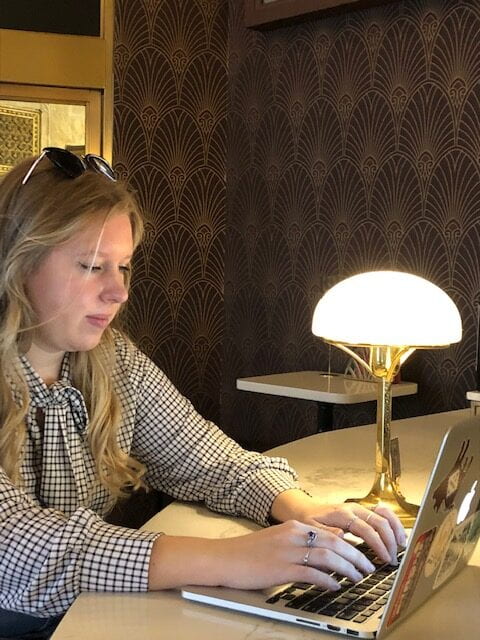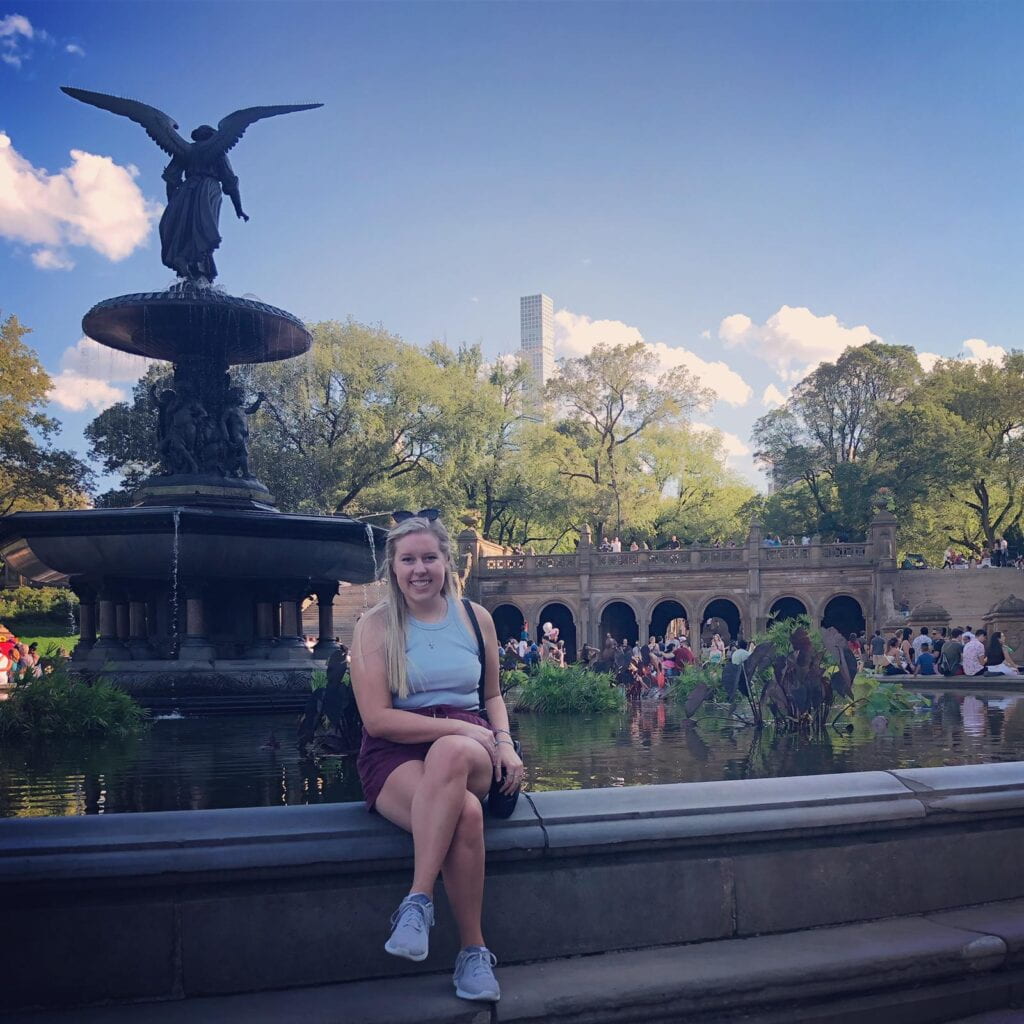
The new President of the Cyber Policy Professional Society discusses leadership and diversity in the Science, Technology, Engineering, and Mathematics (STEM) related fields. She also unveils what makes the Master’s of Science in Global Conflict, Security and Cybercrime program at NYU’s Center for Global Affairs special.
Interview by Priya Singh, Candidate, MS in Global Security, Conflict and Cybercrime
What influenced you to lead the Cyber Policy Professional Society Club?
At first, I wasn’t planning on running since I am graduating in May, and I didn’t want to step into a position which I would be leaving within a few months. But, as you said you wouldn’t be running in these elections, I figured I should try to fill in that leadership gap. It also felt important to continue the legacy of a female leader in our program, since our field is so heavily dominated by men.
Where are you from originally, where did you spend your undergrad years, and what did you study?
My hometown is Prairie Village, Kansas, and I know it sounds like it should be in the middle of a cornfield, but it’s a suburb of Kansas City. I attended the University of Arkansas, where I received my BA in Criminology and Sociology. While there, I also studied German and got the opportunity to spend a semester studying abroad in Berlin. The MS in Global Security and Cybercrime (MSGSCC) program was not initially on my radar as I was applying to other graduate schools to pursue a masters in criminology. I sat through multiple webinars for the School of Professional Studies (SPS), the Center for Global Affairs (CGA), and the MSGSCC program, and decided to apply. The rest is history.
What do you think is the significance of embracing female leadership roles in global security, conflict and cybercrime?
Diversity is so important at the table. Women have long been shut out of jobs, particularly in the field of technology and cybersecurity. As women, we too have our own perspectives and opinions to bring to the table, which are equally important as the one’s men have had the privilege of offering. And, to be clear, I’m not asking those who are already at the table to give up their spots. I think the table should grow and more chairs must be added.
Having women in leadership roles is important because if the same people are trying to solve all the challenges, then we are not going to make a lot of progress. Largely, women haven’t been given the same academic opportunities as men, and that is not a thing of the past. Just look at the Science, Technology, Engineering, and Mathematics (STEM) related classrooms, and you can clearly observe the gender gap. While, luckily, in my time this is changing, it’s still a slow moving process. It also gives me hope when I see programs and initiatives the US government is taking to recognize women in these fields. We’re definitely starting to see more women hold leadership roles not only in cyber, but across the board.

Who are some figures that you admire in the cyber security and policy world?
I really admire Jen Easterly, the Director of the Cybersecurity and Infrastructure Security Agency (CISA). Ms. Easterly is doing such a great job leading during a time when a new agency is facing the massive challenge to protect the critical infrastructure of the United States. I can’t wait to see more leadership and influence unfold in key positions over the years. Another figure I admire is Marillyn Hewson, Chief Executive Officer and President of Lockheed Martin. What drew me to her is that she is from my home state, less than a 3-hour drive from where I grew up. As people always call Kansas a flyover state and don’t think too much of it, it’s inspiring to see someone from the same place as myself fill a position so important as the CEO of a large and innovative company focusing on pushing technology forward.
“The low-end estimate is that there are roughly 700,000 unfilled cyber jobs at the moment, and that number isn’t getting any smaller.”
Name one feature that you think distinguishes the Cybercrime program.
While there are students who do have a cyber-related degree or have a professional experience in this field, I love that there are quite a few of us who don’t. By being here we are able to offer other perspectives and backgrounds to help develop a well-rounded program. We constantly communicate with our fellow students and argue different ideas and angles we wouldn’t have thought of without that diverse culture and background to draw from. We represent multiple countries, which is wonderful, because then we can bring in different perspectives in governance, cyber related issues, and global challenges. It’s also great to see the diverse and specialized course curriculum at CGA. We’re encouraged to take courses which challenge us, or allow us to focus on our academic interests. Our faculty lead Dr. Pano Yannakogeorgos is all about empowering women in this field, and over 60% of our program’s student population is female. So, it is wonderful to come into the classroom and know that we are being advocated for and encouraged to achieve our goals. I feel proud to be in a program that is actively pushing for more female representation.
What characterizes students in the Cybercrime program at CGA?
One of the main characteristics that captures the students in the MSGSCC program is how willing we are to constantly challenge ourselves. Cyber is an exciting field, and for the students to tackle national security issues amidst constantly shifting global geopolitical dynamics says a lot about who we are. We are always willing to work hard, and ask the tough questions. Since we are also a small program, it really does feel like we have a shared community experience. We strive to share our resources, advice, job listings, etc.
What are the job opportunities for graduates in your chosen field?
The low-end estimate is that there are roughly 700,000 unfilled cyber jobs at the moment, and that number isn’t getting any smaller. One of the great things about the cyber field is the amount of different avenues one can pursue. There’s the private or public sector, non-governmental organizations. within these avenues, there are different areas to develop our expertise in, such as finance, compliance, policy, audit, IT, and many more. There are challenges too as this is a highly competitive field. But, so far, the graduates from our program have been taking advantage of the many opportunities offered to us through our university. These include a plethora of internships and opportunities which we have access to, besides the amazing resources to guide us in our endeavors: our fellow classmates, professors and advisors, and NYU’s Wasserman’s center for career development, which prepares and assists students in several areas such as interview coaching, and how to craft a quality resume.
“Having women in leadership roles is important because if the same people are trying to solve all the challenges, then we are not going to make a lot of progress. Largely, women haven’t been given the same academic opportunities as men.”
Pick one issue in cybercrime that you think matters most in 2021
Ransomware attacks, especially on critical infrastructure. The Colonial Pipeline attack is an excellent example of how one of the largest fuel pipelines in the United States was held for ransom. Now imagine if the power grid was down for hours, days, or weeks. It’s terrifying to think of how malicious cyber operations could change the way we live.
Which has been the most challenging part of being a student during the Covid-19 Pandemic?
To create personal relationships with my peers, faculty, and in the networking scene. I went through my first semester entirely remote while staying in Kansas City. It was certainly easy to feel disconnected from my university, my community and New York city at large. Not being able to engage in relationships which grow organically when you see people in person, was very hard. Frankly, it felt like I wasn’t a “real” student at NYU and wasn’t getting the full experience of being a graduate student. But, I’m sure that this isn’t just my story. Many students must have felt the same globally. Besides, there have been several challenges that faculty, and administrators too have had to face. Fortunately, we all are resilient and have continued to push on and do the best we can while living during a pandemic.
What is your dream job?
Since my sophomore/junior year of high school, I have dreamed of working for a federal agency. Now that I am in the MSGSCC program, I still have that dream of working in government, but it’s changed to wanting to work as a policy analyst or in risk compliance. The beauty of still being young and new to this field is that I have so much time to explore and find what I want to do. I don’t feel tied down to one certain job or company/agency. It sounds a bit cliché, but I just want to make a difference. I want to make sure that people don’t just feel safe, but are safe and secure in their homes, the US, and abroad.
Is there anything that you will remember most from your time in New York City and at CGA?
I will always cherish my time here in New York and at the Center for Global Affairs. There are so many incredible people here, and all are so very talented. While my time here may have been short, I’m so thankful for all the experiences and memories that I’ll take with me. Last year, I assisted with the Cyber Security Awareness Week (CSAW) competition. This was an eye-opening experience which enabled me to be involved in a global competition, hear from experts in the field, and allowed everyone to be part of a series of thought-provoking and credible solutions which the competing teams presented to us. I’m equally thankful to be able to carry on with the cyber club and help formally establish our space within CGA and NYU at large. GAR